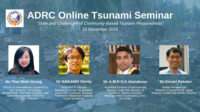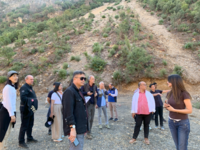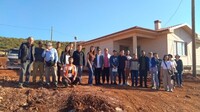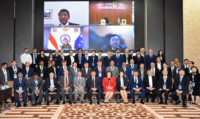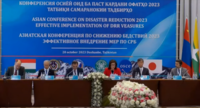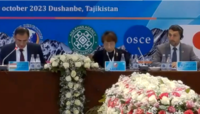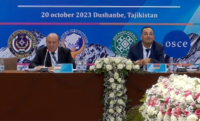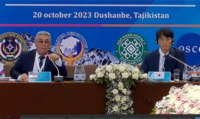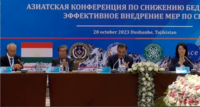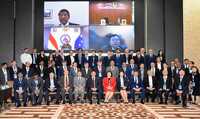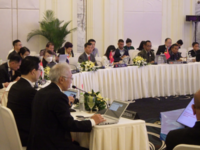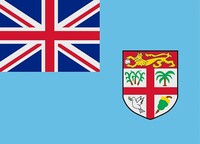20 October 2023 (Dushanbe, Tajikistan)
The Asian Conference on Disaster Reduction (ACDR) 2023, held on 20 October 2023 in Dushanbe, Tajikistan was attended by a total of 120 participants in person at Hyatt Regency Dushanbe, while 111 joined online. The theme for the conference this year was: "Effective Implementation of DRR Measures -Enabling Digital Transformation in DRR-".
OPENING CEREMONY
We had the honour of having Ms Sattoriyon Matlubakhon Amonzoda, Deputy Prime Minister of the Republic of Tajikistan, make the first speech to open the conference. She addressed that Tajikistan is committed to implementing the Sendai Framework for Disaster Risk Reduction (SFDRR) through various initiatives, including investment in resilient infrastructure and the adoption of the National Disaster Risk Mitigation Strategy. She emphasized that the effects of climate change affect all countries, including Tajikistan whose topography is 93% mountainous.
Ms Mami Mizutori, Special Representative of the UN Secretary-General for DRR, stated that by 2030, climate change will cause over 5 million people to be internally displaced in Central Asia. To reduce the impact, she stressed the need for a paradigm shift in risk management. She noted the importance of incorporating DX through the application of data analysis and machine learning to support evidence-based, data-driven decisions.
Mr MATSUMURA Yoshifumi, Minister of State for Disaster Management, Government of Japan, emphasized the importance of identifying disaster risks, investing in mitigation, and sharing 'Build Back Better' experiences. He expressed hopes for ACDR2023 to be a venue for sharing pivotal technologies and expertise for disaster risk reduction.
Dr HAMADA Masanori, Chairman of the ADRC, announced that Fiji joined as the 32nd member country of ADRC in August 2023. He also emphasized the increasing risk of climate change disasters and the need to enhance infrastructure and social systems to adapt and become more resilient.
Mr Rustam Nazarzoda, Chairman of the CoES highlighted the collaboration between the CoES, the Cabinet Office of Japan, and ADRC in hosting this opportunity. ACDR2023 serves as a platform for policy sharing, knowledge exchange, and cooperation in DRR. Tajikistan is one of the UN pilot areas for the Early Warning for All initiative. As the host of ACDR2023, Tajikistan aims to foster greater unity within the international community.
ROUNDTABLE SESSION
Aimed at providing the ADRC member countries with an opportunity to discuss how to leverage collective action and cooperation in accelerating the implementation of the Sendai Framework towards 2030, this session was co-chaired by Mr Nazarzoda, Chairman of the CoES, Ms TSUNOZAKI Etsuko, Board Member, SEEDS Asia, and Mr Sebastian Penzini, Acting Head, Regional Office for Europe and Central Asia, United Nations Office for Disaster Risk Reduction (UNDRR).
16 speakers from ADRC member countries (Armenia, Bhutan, Indonesia, Iran, Malaysia, Maldives, Mongolia, Nepal, Pakistan, Papua New Guinea, Philippines, Singapore, Sri Lanka, Tajikistan, Thailand, and Viet Nam) shared the opportunity to convey official statements highlighting the progress and challenges in implementing the four priorities of the Sendai Framework.
To address those gaps, the official statements offered the following recommendations: 1) Scale-up sharing of policies and measures that promote DRR efforts in a coordinated manner, particularly on policies relating to disaster database, early warning, and community-based disaster risk management as well as on measures relating to information management systems, regional knowledge sharing, and disaster response mechanisms. 2) Promote sub-regional cooperation in addressing complex and transboundary disaster risks, particularly earthquakes, floods, and typhoons. 3) Forge partnerships and joint projects in the areas of hazard and risk identification, mapping, and assessments in a manner that puts greater emphasis in science-based approaches and embrace digital technologies for multi-hazards disaster risk reduction.
SESSION 1 "Innovative Solutions for Resilient Societies: DRR Technologies for Earthquakes and Geological Hazards"
This session was co-chaired by Mr Pulod Aminzoda, Director of the Institute of Geology, Earthquake Engineering and Seismology of the National Academy of Sciences of Tajikistan, and Dr Sos Margaryan, Director, National Survey for Seismic Protection (NSSP), Armenia.
Six session speakers from Tajikistan, Kyrgyz Republic, International Research Institute of Disaster Science, Tohoku University (IRIDeS), UNDRR, CoES, and Turkiye, reported on their current efforts and challenges as well as the latest multifaceted approaches including visualization of disaster risk using DX, measures for earthquake resistance and slope stabilization in cities, and development of design technologies and new materials for disaster-resistant buildings and structures.
It was confirmed that a multifaceted approach is necessary to cope with earthquake and landslide disasters, including citywide seismic intensity estimation and DRR measures using sensors and AI technology, development of new building technologies and materials, and urban planning that incorporates a DRR perspective. It was also confirmed that it is essential for local residents, relevant organizations and businesses to work together on an efficient DRR measures involving the entire community to minimize the damage caused by earthquakes. Information on advanced technologies and initiatives to mitigate damage from earthquakes and landslides as well as practical DRR measures were shared to realize an earthquake-resilient society.
SESSION 2 "Adaptation to the Climate Crisis: Innovative Approaches to Monitoring and Responding to Glacial Lake Outburst Floods (GLOFs) and Intensifying Floods"
This session was co-chaired by Prof. Abdulhamid Kayumov, Director of the Center for Glacier Studies of the National Academy of Sciences of Tajikistan, and Dr Changje Kwak, Research Scientist, National Disaster Management Research Institute (NDMI), Republic of Korea.
Six session speakers from Tajikistan, Center for Emergency Situations and Disaster Risk Reduction (CESDRR), International Centre for Integrated Mountain Development (ICIMOD), Republic of Korea, CoES and Agha Khan reported the current situations and efforts taken against climate crisis related disasters. The climate crisis has resulted in extreme weather events in many parts of the world. High temperatures and precipitation are causing increased GLOFs, receding glaciers, more frequent and widespread forest fires, and more prolonged and damaging floods that are seriously threatening the society and the environment. This session focused on innovative approaches to monitoring and responding to GLOFs, forest fires, and floods. Past efforts in weather-related disaster risk assessment and forecasting were reviewed while analytical methods and forecasting models using innovative technologies such as satellite observations, remote sensing, artificial intelligence (AI), and machine learning were evaluated.
CLOSING CEREMONY
Before closing the conference, Mr Nazarzoda, Chairman of the CoES conducted the DRR Award Ceremony of Tajikistan.
Mr SASAHARA Akio, Executive Director of the ADRC, provided a summary of the ACDR2023 and expressed gratitude to Tajikistan for hosting the event. He highlighted key points shared during the roundtable and technical sessions.
Dr OGAWA Yujiro, the Executive Secretary of the ADRC, acknowledged the efforts in providing information through the Global unique Disaster Identifier number (GLIDEnumber). He also noted the increased frequency of disasters worldwide and stressed the significance of learning from these events. He also mentioned that the study visit the earthquake-affected sites in Turkiye would be a part of such learning.
Mr Nazarzoda, Chairman of the CoES, emphasized the importance of knowing the necessary measures to be taken for earthquake and disaster risk reduction. He stressed the significance of sharing and gathering data among member countries.
For more information on ACDR2023, please visit the ACDR2023 website
ADRC is grateful for all the participations. We will also like to thank again the CoES for the hard work to make this event possible.
(2023/10/28 15:00)


